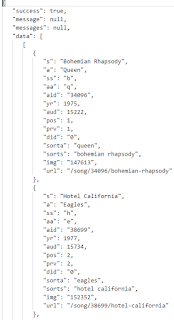Last week I attended Neil Chandler's session on JSON during the POUG conference in beautiful Sopot, Poland.
The
JSON Developer's Guide recommends using BLOB for storing data, and this is what Neil also recommended.
I was under the (FALSE!) impression that it was not possible to put an IS JSON check constraint on a BLOB column, simply because I tried once and got an exception.
After the session I asked Neil if this was the case, but (of course) he said that it was possible.
"Trust, but verify", so here is my test case.
My tests are done on a 12.1.0.2.0 release of the Oracle database, as can be seen in the output below.
SQL> select banner
2 from v$version
3 /
BANNER
--------------------------------------------------------------------------------
Oracle Database 12c Enterprise Edition Release 12.1.0.2.0 - 64bit Production
PL/SQL Release 12.1.0.2.0 - Production
CORE 12.1.0.2.0 Production
TNS for Solaris: Version 12.1.0.2.0 - Production
NLSRTL Version 12.1.0.2.0 - Production
First of all create a table with a BLOB column to hold the JSON data.
SQL> create table t
2 (json_data blob)
3 /
Table T created.
The most easiest way of placing an IS JSON check constraint on the column is to use the following statement:
SQL> alter table t add constraint json_chk check (json_data is json)
2 /
Error starting at line : 1 in command -
alter table t add constraint json_chk check (json_data is json)
Error report -
ORA-40499: no format defined for binary data type
Because it failed, I was under the assumption that it is not possible to place an IS JSON check constraint on the column.
Turns out that I was not complete in my check constraint definition (guess I should have read the exception and documentation more closely).
When you place the check constraint in the following manner on the column, the IS JSON constraint is added.
SQL> alter table t add constraint json_chk check (json_data is json format json)
2 /
Table T altered.
In later versions of the database (I've also tried on 12.2 and 18c) it is possible to use the former syntax, there is no need
to use "FORMAT JSON" in the check constraint definition.
Let's see the BLOB column with the check constraint in action.
First attempt to insert a valid JSON-string into the table:
SQL> insert into t values ('{"this":"that"}' )
2 /
Error starting at line : 1 in command -
insert into t values ('{"this":"that"}' )
Error report -
ORA-01465: Ongeldig hexadecimaal getal.
Even though the string is valid JSON, it is not a binary representation. For this to work UTL_RAW is required:
SQL> insert into t values (utl_raw.cast_to_raw('{"this":"that"}') )
2 /
1 row inserted.
Trying to create an entry in the table which is not JSON will result in a violation of the JSON check constraint.
SQL> insert into t values (utl_raw.cast_to_raw('just a string') )
2 /
Error starting at line : 1 in command -
insert into t values (utl_raw.cast_to_raw('just a string') )
Error report -
ORA-02290: CHECK-beperking (ALEX.JSON_CHK) is geschonden.
When the value that you're trying to insert is not a binary value, it will always fail with "ORA-01465: invalid hex number":
SQL> insert into t values ('just a string' )
2 /
Error starting at line : 1 in command -
insert into t values ('just a string' )
Error report -
ORA-01465: Ongeldig hexadecimaal getal.
One of the benefits of placing an IS JSON check constraint on the column is that you can use a "dot-notation" to query out the data:
SQL> select tst.json_data.this
2 from t tst
3 /
THIS
--------------------------------------------------------------------------------
that
Keep in mind that you must use a table alias for this to work. Omitting the table alias will result in an error.
SQL> select json_data.this
2 from t tst
3 /
Error starting at line : 1 in command -
select json_data.this
from t tst
Error at Command Line : 1 Column : 8
Error report -
SQL Error: ORA-00904: "JSON_DATA"."THIS": ongeldige ID


